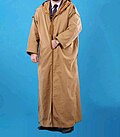| Revision as of 17:31, 23 January 2024 view sourceSkitash (talk | contribs)Extended confirmed users, Pending changes reviewers, Rollbackers11,823 edits Undid revision 1198256956 by Numidae (talk) unsourcedTags: Undo Reverted← Previous edit | Revision as of 17:33, 23 January 2024 view source Skitash (talk | contribs)Extended confirmed users, Pending changes reviewers, Rollbackers11,823 edits Reverted 2 edits by 105.103.47.207 (talk) unsourcedTag: Manual revertNext edit → | ||
| Line 12: | Line 12: | ||
| }} | }} | ||
| A '''qashabiya''' ( |
A '''qashabiya''' ({{lang-ar|قشابية|qašābiyyah}}), also styled '''Kachabia''', '''Kachabiya''' or '''kchabia''', is a traditional berber ]n garment most often associated with the ], and those from ]. It is made of ] and ], and is held in high esteem by many Algerians because of the warmth it provides during cold winters, especially in the high plateaus of the Chaouia region where it is produced. | ||
| == Description == | == Description == | ||
| ] | ] | ||
| It is a long brown garment with a hood that is comparable to the ] but considerably thicker. A qashabiya is made of pure wool or wbar (]). This outfit is from the region of ] of central ]. It is particularly popular among residents of Algeria's central and eastern semi-arid areas (], ], ], ], ], ], ], ] ...). | |||
| It is part of the outfits worn by the ] and was subsequently exported throughout the country and even crossed borders to neighboring countries. Modern Kachabia come in a variety of colors and designs and may be worn by both men and women, despite the fact that it is still considered a masculine outfit. | It is part of the outfits worn by the ] and was subsequently exported throughout the country and even crossed borders to neighboring countries. Modern Kachabia come in a variety of colors and designs and may be worn by both men and women, despite the fact that it is still considered a masculine outfit. | ||
Revision as of 17:33, 23 January 2024
Algerian clothing Men wearing the qashabiya Men wearing the qashabiya | |
| Material | Camel hair and wool |
|---|---|
| Place of origin | Algeria |
A qashabiya (Template:Lang-ar), also styled Kachabia, Kachabiya or kchabia, is a traditional berber Algerian garment most often associated with the Chaoui, and those from Djelfa. It is made of camel hair and wool, and is held in high esteem by many Algerians because of the warmth it provides during cold winters, especially in the high plateaus of the Chaouia region where it is produced.
Description

It is a long brown garment with a hood that is comparable to the djellaba but considerably thicker. A qashabiya is made of pure wool or wbar (camel hair). This outfit is from the region of Djelfa of central Algeria. It is particularly popular among residents of Algeria's central and eastern semi-arid areas (Ammi Moussa, Relizane, Chlef, Djelfa, M'sila, Aurès, Biskra, Bou-Saada ...).
It is part of the outfits worn by the Chaoui people and was subsequently exported throughout the country and even crossed borders to neighboring countries. Modern Kachabia come in a variety of colors and designs and may be worn by both men and women, despite the fact that it is still considered a masculine outfit.
See also
References
- Meguellati-Kanoun, Amel; Abdelali-Martini, Malika; Kanoun, Mohamed; Benmebarek, Abdelmadjid; Benidir, Mohamed (2013-12-17). "The potential loss of traditional know-how of qashabiya production in Djelfa, Algeria". In Malika Abdelali-Martini; Aden Aw-Hassan (eds.). Gender Research in Natural Resource Management: Building Capacities in the Middle East and North Africa. Routledge. pp. 37–55. ISBN 978-1-317-91634-5.
- Benmebarek, Abdelmadjid; Larbi Cherfaoui, Mohamed; Ouazane, H.; Abdelali-Martini, Maliki; Meguellati-Kanoun, Amel; Kanoun, Mohamed; Fodil, Souhila (2013-12-17). "Gender and Marketing of qashabiya in Djelfa (Algeria)". In Malika Abdelali-Martini; Aden Aw-Hassan (eds.). Gender Research in Natural Resource Management: Building Capacities in the Middle East and North Africa. Routledge. pp. 56–73. ISBN 978-1-317-91634-5.
| Sufism terminology | ||
|---|---|---|
| Sufis |  | |
| Concepts | ||
| Awrad |
| |
| Waridates | ||
| Misconducts | ||
| Ceremonies | ||
| Arts | ||
| Places | ||
| Objects | ||
This clothing-related article is a stub. You can help Misplaced Pages by expanding it. |